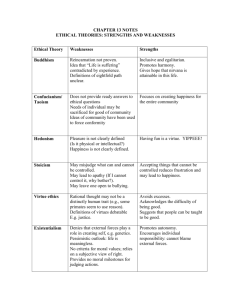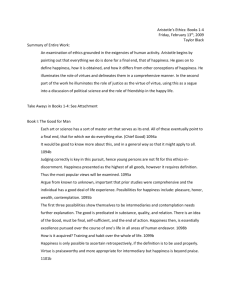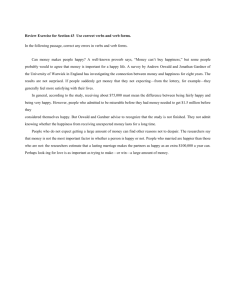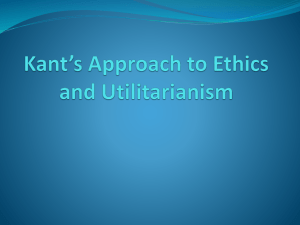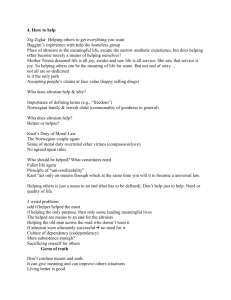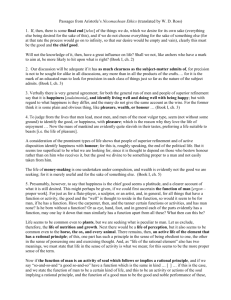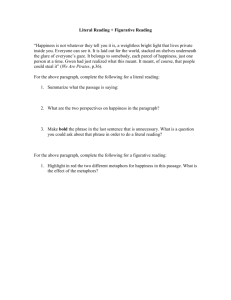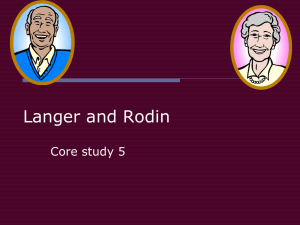Ch 7 Ethics Quiz
advertisement
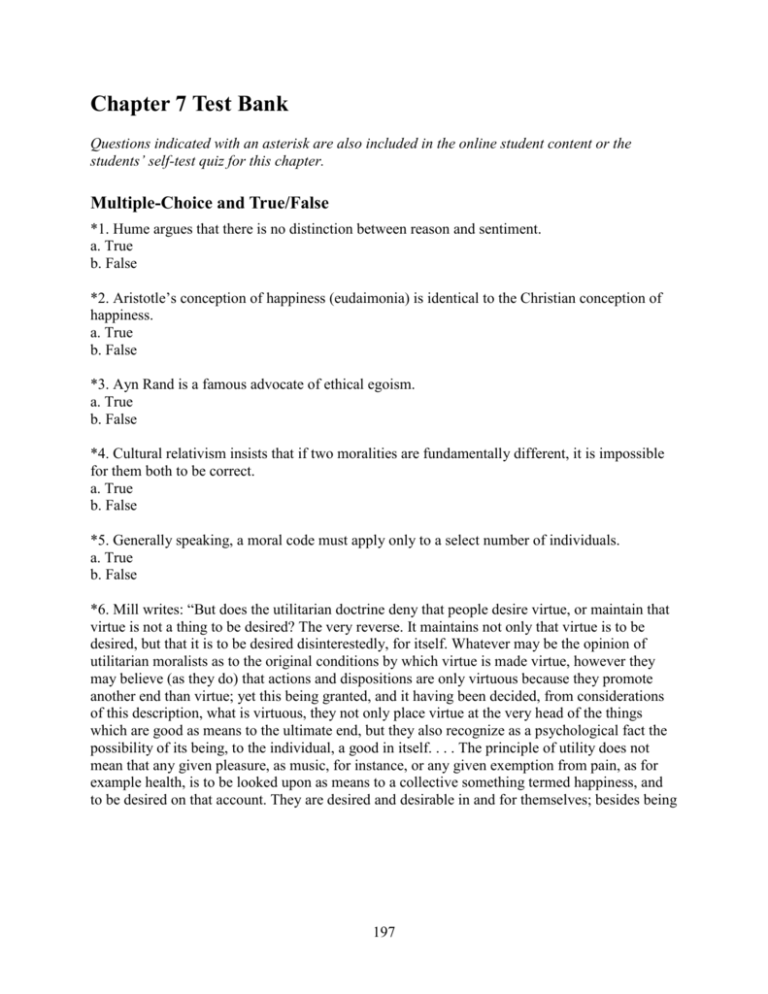
Chapter 7 Test Bank Questions indicated with an asterisk are also included in the online student content or the students’ self-test quiz for this chapter. Multiple-Choice and True/False *1. Hume argues that there is no distinction between reason and sentiment. a. True b. False *2. Aristotle’s conception of happiness (eudaimonia) is identical to the Christian conception of happiness. a. True b. False *3. Ayn Rand is a famous advocate of ethical egoism. a. True b. False *4. Cultural relativism insists that if two moralities are fundamentally different, it is impossible for them both to be correct. a. True b. False *5. Generally speaking, a moral code must apply only to a select number of individuals. a. True b. False *6. Mill writes: “But does the utilitarian doctrine deny that people desire virtue, or maintain that virtue is not a thing to be desired? The very reverse. It maintains not only that virtue is to be desired, but that it is to be desired disinterestedly, for itself. Whatever may be the opinion of utilitarian moralists as to the original conditions by which virtue is made virtue, however they may believe (as they do) that actions and dispositions are only virtuous because they promote another end than virtue; yet this being granted, and it having been decided, from considerations of this description, what is virtuous, they not only place virtue at the very head of the things which are good as means to the ultimate end, but they also recognize as a psychological fact the possibility of its being, to the individual, a good in itself. . . . The principle of utility does not mean that any given pleasure, as music, for instance, or any given exemption from pain, as for example health, is to be looked upon as means to a collective something termed happiness, and to be desired on that account. They are desired and desirable in and for themselves; besides being 197 Instructor’s Test Bank – Chapter 7 means, they are a part of the end. Virtue, according to the utilitarian doctrine, is not naturally and originally part of the end, but it is capable of becoming so; and in those who love it disinterestedly it has become so, and is desired and cherished, not as a means to happiness, but as a part of their happiness.” According to Mill, what is the “ultimate end” that virtues promote? a. Christian goodness b. altruism c. egoism d. happiness e. human deterioration *7. For Mill, music is an example of __________. a. a virtue b. gross hedonism c. an epicurean necessary pleasure d. a higher pleasure e. a swinish delight *8. Why might we disinterestedly love virtue, as Mill suggests when he writes, “Virtue, according to the utilitarian doctrine, is not naturally and originally part of the end, but it is capable of becoming so; and in those who love it disinterestedly it has become so, and is desired and cherished, not as a means to happiness, but as a part of their happiness”? a. because it is better to be a swine satisfied than Socrates dissatisfied b. because we share natural and necessary pleasures with other animals c. because my happiness means the happiness of all mankind d. because virtue may contribute to the happiness of many e. because utility, not mere happiness, dictates the good for humans *9. Nietzsche writes: “The slave revolt in morals begins by rancor turning creative and giving birth to values—the rancor of beings who, deprived on the direct outlet of action, compensate by an imaginary vengeance. All truly noble morality grows out of triumphant self-affirmation. Slave ethics, on the other hand, begins by saying no to an ‘outside,’ an ‘other,’ a non-self, and that no is its creative act. This reversal of direction of the evaluating look, this invariable looking outward instead of inward, is a fundamental feature of rancor. Slave ethics requires for its inception a sphere different from and hostile to its own. Physiologically speaking, it requires an outside stimulus in order to act at all; all its action is reaction. The opposite is true of aristocratic valuations; such values grow and act spontaneously, seeking out their contraries only in order to affirm themselves even more gratefully and delightedly.” Nietzsche is here describing the difference between __________. a. Christian morality and Lutheran morality b. Greek morality and Hellenic morality c. Master and slave morality d. Utilitarianism and Christian ethics e. Slave ethics and Kantian ethics 198 Instructor’s Test Bank – Chapter 7 *10. According to Nietzsche, the creative principle of slave ethics is __________. a. reason b. ressentiment (resentment) c. mitleid (pity) d. joie de vivre (the love of life) e. arete (virtue) *11. Slave ethics “compensates by an imaginary vengeance.” Another imaginary vengeance we inflict upon ourselves is __________. a. feeling aristocratic because of arrogance b. feeling guilty because of the drive to cruelty c. feeling lonely because of the rebellion of the herd d. feeling masterful because of superiority e. feeling slavish because of Christian morality *12. Kant writes: “If I think of a hypothetical imperative in general, I do not know beforehand what it will contain until its condition is given. But if I think of a categorical imperative, I know immediately what it contains. For since, besides the law, the imperative contains only the necessity that the maxim should accord with the law, while the law contains no condition to restrict it, there remains nothing but the universality of a law as such with which the maxim of the action should conform. This conformity alone is properly what is represented as necessary by the imperative. Hence, there is only one categorical imperative, and it is this: Act only according to that maxim whereby you can at the same time will that it should become a universal law.” Kant defines a maxim as __________. a. a rule of individual psychology b. a subjective principle of action c. “a rational activity of the mind in accordance with itself” d. “a contradiction in a system of nature” e. “a universal law of nature” *13. “There is only one categorical imperative, and it is this: Act only according to that maxim whereby you can at the same time will that it should become a universal law.” From this formulation of the categorical imperative, Kant derives another, which states: a. “Treat humanity, whether in your own person or the person of any other, never merely as a means, but also always as an end in themselves.” b. “Treat reason, as the fundamental principle of action, always as a guide.” c. “Act only according to that maxim whereby you can at the same time will that it should agree with your inclinations.” d. “Therefore the universal law of nature is, the existence of things so far as it is determined by universal law.” e. “Serve the will as the objective ground of its self-determination, and all such relative ends can be grounds only for hypothetical imperatives.” 199 Instructor’s Test Bank – Chapter 7 *14. According to Kant, hypothetical imperatives __________. a. provide certain kinds of moral law but not all kinds b. depend upon the world c. contain only the necessity that the maxim should accord with the law d. are necessarily contradictory e. form the basis of Kant’s moral theory *15. According to Kant, in order to test the moral validity of a maxim, one should first _______. a. refute it b. examine it genealogically c. address its historical origins d. restrict it e. universalize it *16. One large difference between deontologists and utilitarians is that __________. a. deontologists believe our intentions are morally significant; utilitarians generally do not b. utilitarians believe our intentions are morally significant, and deontologists generally do not c. deontologists insist on the moral primacy of happiness, but utilitarians generally do not d. deontologists believe that the only good thing that can be imagined that is good in itself is that which all people seek as a good: pleasure e. utilitarians insist that moral duty, after all, may often conflict with the happiness of the many *17. Utilitarianism is often characterized as a kind of __________. a. deontology b. virtue ethics c. rational feminism d. altruism e. consequentialism *18. A popular objection to Bentham’s version of utilitarianism complained that __________. a. utilitarian calculations could be manipulated to benefit the calculator b. utilitarian calculations could be manipulated to benefit the many c. utilitarians must perform calculations of utility d. happiness is the true foundation of morality e. the happiness of the many is more important than the happiness of the few *19. “The creed which accepts as the foundation of morals ‘utility’ or ‘the greatest happiness principle’ holds that actions are right in proportion as they tend to promote happiness; wrong as they tend to produce the reverse of happiness. By happiness is intended pleasure, and the absence of pain; by unhappiness, pain, and the privation of pleasure.” The author of this passage is __________. a. Kant b. Mill c. Hume d. Hobbes e. Aristotle 200 Instructor’s Test Bank – Chapter 7 *20. “The creed which accepts as the foundation of morals ‘utility’ or ‘the greatest happiness principle’ holds that actions are right in proportion as they tend to promote happiness; wrong as they tend to produce the reverse of happiness. By happiness is intended pleasure, and the absence of pain; by unhappiness, pain, and the privation of pleasure.” Because of its emphasis on pleasure, the moral theory described in this passage is certainly a form of __________. a. egoism b. hedonism c. feminism d. rational choice theory e. deontology *21. “The creed which accepts as the foundation of morals ‘utility’ or ‘the greatest happiness principle’ holds that actions are right in proportion as they tend to promote happiness; wrong as they tend to produce the reverse of happiness. By happiness is intended pleasure, and the absence of pain; by unhappiness, pain, and the privation of pleasure.” The moral theory introduced in this passage insists that the highest good is __________. a. maximum pleasure for the most b. maximum pleasure for the individual c. maximum pleasure for the few d. happiness but not pleasure e. pleasure but not happiness *22. “The creed which accepts as the foundation of morals ‘utility’ or ‘the greatest happiness principle’ holds that actions are right in proportion as they tend to promote happiness; wrong as they tend to produce the reverse of happiness. By happiness is intended pleasure, and the absence of pain; by unhappiness, pain, and the privation of pleasure.” The author of this passage thinks that the best proof of the fact that pleasure is a human good is that __________. a. all humans do, in fact, seek it b. humans are often willing to sacrifice it for other moral goods c. lower pleasures lead to pains d. “Better to be Socrates dissatisfied than a swine satisfied!” e. it follows from reason and is consistent with it *23. Sartre argues that morality is developed __________. a. a priori b. in accordance with virtue c. by the individual d. using the principle of utility e. through inclination 201 Instructor’s Test Bank – Chapter 7 24. Morality can be defined as a set of fundamental rules that guides our actions. a. True b. False 25. Which is not a moral rule by which we live with other people? a. Morality sets limits to our desires and actions. b. Morality tells us what is permitted and what we ought to do as well as what is not permitted and what we ought not do. c. Morality delineates guiding principles for making decisions. d. Morality aids us in getting what we want. 26. Two important characteristics of inner judgments are: The agent has reasons to do something, and the agent (as well as everyone else) endorses these reasons. a. True b. False 27. It is ethical, not psychological, egoism that challenges the possibility of any morality. a. True b. False 28. Who said that if you are ashamed, the best remedy is for you to practice benevolence? a. Xunzi b. Abraham Lincoln c. Mencius d. Ayn Rand 29. In referencing Ayn Rand, Tara Smith argues that egoism is not about relationships to others because if one were stranded on a deserted island, egoism would be equally imperative. a. True b. False 30. What, according to Aristotle, is the final all-sufficing end that all people strive for? a. virtue b. fame c. wealth d. happiness 31. Aristotle thought that virtue is not innate but rather has to be learned by training and becoming habit until it becomes the person’s character. a. True b. False 202 Instructor’s Test Bank – Chapter 7 32. Hume claimed that you cannot derive a(n) __________ from a(n) __________, i.e., you cannot provide a valid argument about what you should do based on the facts alone. a. argument, sentiment b. reason for acting, emotion c. ought, is d. conclusion, fact 33. Which philosopher rejected the idea of basing morality on feelings of any kind? a. Aristotle b. Kant c. Hume d. Rousseau 34. Who said that the first impulses of nature are always right? a. Aristotle b. Kant c. Hume d. Rousseau 35. Categorical imperative is the name Kant gives to duty, i.e., the duty to act in a way that you would be glad if everyone acted that way, too. a. True b. False 36. A “maxim,” according to Kant, is a subjective principle of action, i.e., one’s intention. a. True b. False 37. Bentham said that “nature has placed mankind under two sovereign masters.” They are __________. a. God and Satan b. parents and employers c. pain and pleasure d. love and hate 38. The “happiness calculus” is used by game theorists to establish the duties and responsibilities of citizens of particular governments. a. True b. False 39. Nietzsche’s attack on universal moral principles has been one of the most vigorous philosophical movements of the twentieth century. a. True b. False 203 Instructor’s Test Bank – Chapter 7 40. Who said “Man is nothing else but that which he makes of himself” and “man makes himself”? a. Nietzsche b. Sartre c. Aristotle d. Kant 41. Why shouldn’t the existentialist consult feeling as a guide for action? a. because feelings are formed by the action one does b. because feelings are not correlated with the truth c. because existentialists are not supposed to have any feelings d. because feelings are fickle 42. The existentialist commits to a set of values by accepting, a priori, the rules and principles imposed by God and society. a. True b. False 43. Dewey argues that the knowledge of the relations between changes that enable us to connect things as antecedents and consequences is science. a. True b. False 44. Which Harvard psychologist changed the course of ethics by arguing that women tend to think about moral issues differently than men do, thereby challenging the standard initial assumptions on which further philosophical inquiry is made? a. Rousseau b. John Steward Mill c. Carol Gilligan d. Virginia Held 45. The whole enterprise of mothering has been historically left out of moral theory until recently, as if it were a purely biological function without a rational, philosophical component. a. True b. False 46. What do art and morality have in common? According to Sartre, what elements unite them? a. beauty and power b. sublimity c. a creator d. creativity and invention 47. The view that women are inherently deficient moral creatures has been pervasive in ethical theory throughout human history. a. True b. False 204 Instructor’s Test Bank – Chapter 7 48. There are valid and sound arguments against homosexuality, the logic of which has never, to date, been dismantled by philosophers. a. True b. False Discussion/Essay *49. Compare Rousseau’s notion of conscience with Hume’s notion of sentiment. Does one theory seem to be stronger than the other, based on the differences and/or similarities between the notions of sentiment and conscience? *50. Does Aristotle’s model of virtue ethics depend only upon social constructs, or does it also leave room for autonomy? Defend your answer. *51. Consider how one might reconcile the rule-based system of Kant with the consequencebased system of utilitarianism. Can the two ethical systems complement one another? *52. Think of one or more moral dilemmas that cannot be satisfactorily solved by either Kant or Mill. Does Nietzsche provide a solution? *53. What are the moral dangers of suggesting, as Nietzsche and Sartre do, that individuals create their own value systems? Could a prison guard in a Nazi concentration camp describe himself as a “good person” on existentialist grounds? *54. How plausible is the idea that men and women make their moral choices using different rules and criteria? Given the choice between saving your own child’s life and the life of someone else’s child, what would you do, and why? What would Mill do? Kant? 55. Does it make any sense to ask whether some action is right or wrong apart from any relation to a comparison class? Is the predicate “is right” functionally different from “is tall,” “is sour,” or “is located between A and B”? Don’t we ask if Sam is tall in relation to Betty, or as compared with most people? We wouldn’t understand what was meant by “sour” unless we had tasted sweet, would we? “Is the post office located between Main Street and First Street?” is a relational question that cannot be answered unless we had Main Street and First Street for comparison. Moral relativism asserts that “is right” needs a comparison class, too. Do you agree? Argue both pro and con sides of the issue. 56. Consider the anecdote about Abraham Lincoln. While arguing the psychological egoist position with a friend, he stopped to help some drowning piglets. His friend remarked that his action was altruistic, not egoistic, to which Lincoln countered that it was indeed selfishness because if he didn’t stop to help he’d have no peace of mind the rest of the day worrying about the piglets. Is it selfishness? Consider this: Why would Lincoln have had a disturbed peace of mind if he had not helped? Perhaps it is because, as psychological altruism asserts, people naturally act for each other’s sake. Perhaps Lincoln responded to his natural condition of 205 Instructor’s Test Bank – Chapter 7 psychological altruism by acting according to his natural condition of psychological egoism! Discuss. 206 Instructor’s Test Bank – Chapter 7 57. Is Kant correct in asserting that people should be praised or blamed only for what they have control over and not for what they have no control over? It seems obvious that congratulating someone on his height or punishing a mentally handicapped person for not doing algebra correctly is ridiculous. Yet, along with Aristotle, we still do this for virtues and vices, even though a person’s courage, wit, wealth, etc., is often due to heredity and upbringing rather than personal choice. How do you know when, and in what proportion, to praise or blame? 58. Is it possible to be unworthy of happiness? Why or why not? What, according to Kant, would qualify a person for the right to be happy? 59. What did Nietzsche mean by “Man is a rope stretched between the animal and the Űbermensch”? How is man a bridge rather than a goal? Does everyone have the capacity to become an Űbermensch? How does one go about it? Is the “will to power” something morally efficacious? 60. Discuss the most problematic feature of Hobbes’ “state of nature.” Di Stefano points out that Hobbes begins with a scenario that is utterly incredible in that men are not born of, much less nurtured by, women or anyone else. How can a credible philosophy begin with men springing to maturity like mushrooms from the ground without human reproduction and early care having any effect on them? What rational conclusions can be drawn from such a faulty theoretical construct? Answer Key: Multiple-Choice and True/False, Chapter 7 1. b 2. b 3. a 4. b 5. b 6. d 7. d 8. d 9. c 10. b 11. b 12. a 13. a 14. b 15. e 16. b 17. e 18. a 19. b 20. b 21. a 22. a 23. c 24. a 25. d 26. a 27. b 28. c 29. a 30. d 207 31. a 32. c 33. b 34. d 35. a 36. a 37. c 38. b 39. a 40. b 41. a 42. b 43. a 44. c 45. a 46. d 47. a 48. b
